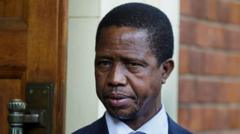As people gather to honor his life and legacy, discussions about his impact on the Roman Catholic Church and the selection of a new pope have commenced.
**World Mourns the Legacy of Pope Francis, First Latin American Pontiff**

**World Mourns the Legacy of Pope Francis, First Latin American Pontiff**
In a significant moment for the Catholic Church, Pope Francis has passed away at the age of 88, with tributes pouring in from around the globe recognizing his advocacy for the marginalized and commitment to social justice.
In a poignant twist of fate, Pope Francis, the first Latin American pontiff, died unexpectedly due to complications from a stroke, as confirmed by the Vatican on April 22, 2025. His passing came only a day after he made a public appearance in St. Peter’s Square for an Easter blessing, leaving many shocked and saddened by his sudden departure at the age of 88. Cardinal Kevin Farrell, a key figure in the Catholic Church, announced that Francis expressed a desire for a simple burial in Rome, stating that his tomb should be “simple and without particular decoration,” embloldening only the name "Franciscus."
As news of his death spread, tears flowed in St. Peter's Square, where many gathered to grieve. One mourner, immersed in sorrow, expressed disbelief by saying, "We saw him yesterday. We did not expect such a tragic ending." The Vatican stated that a public viewing might occur soon, inviting the faithful to pay their respects as ceremonies get underway to select Francis' successor—one who may continue his global, welcoming approach or revert to traditional conservatism.
Francis' tenure has been marked by a heartfelt dedication to humanitarian issues, particularly focusing on migrants and the underprivileged. Leaders from varied backgrounds commended him for addressing crucial issues of migration and social justice. President Trump, in a surprising show of respect despite their previous disagreements, commented on social media that he and the First Lady plan to attend the pope's funeral, eagerly anticipating honor the former pontiff.
Born in Argentina and having undergone a remarkable journey to vatican leadership, Francis used his tenure to bring a fresh perspective to the Church. He revitalized discussions regarding sexual abuse, finances, and even the Church's relationship with LGBTQ communities, making significant strides that opened doors for dialogue. However, he often found himself navigating criticism, particularly from conservative factions both within and outside the Church.
In the wake of his death, reflections emerged globally, particularly from Latin America where many regarded him as a figure of connection and hope. Argentine President Javier Milei proclaimed seven days of mourning, while Catholics in Nicaragua and Cuba expressed pride for his humble beginnings yet disappointment for not advocating more forcefully against injustices in their nations.
As the world reflects on Pope Francis’ influential yet controversial papacy, an anticipated conclave of cardinals will soon convene to select a new leader. With expectations on what direction the next pontiff will take, the legacy that Francis leaves behind ensures ongoing discourse on his efforts toward social reform, inclusivity, and charitable advocacy, setting the stage for a critical moment in the Vatican's future.
As news of his death spread, tears flowed in St. Peter's Square, where many gathered to grieve. One mourner, immersed in sorrow, expressed disbelief by saying, "We saw him yesterday. We did not expect such a tragic ending." The Vatican stated that a public viewing might occur soon, inviting the faithful to pay their respects as ceremonies get underway to select Francis' successor—one who may continue his global, welcoming approach or revert to traditional conservatism.
Francis' tenure has been marked by a heartfelt dedication to humanitarian issues, particularly focusing on migrants and the underprivileged. Leaders from varied backgrounds commended him for addressing crucial issues of migration and social justice. President Trump, in a surprising show of respect despite their previous disagreements, commented on social media that he and the First Lady plan to attend the pope's funeral, eagerly anticipating honor the former pontiff.
Born in Argentina and having undergone a remarkable journey to vatican leadership, Francis used his tenure to bring a fresh perspective to the Church. He revitalized discussions regarding sexual abuse, finances, and even the Church's relationship with LGBTQ communities, making significant strides that opened doors for dialogue. However, he often found himself navigating criticism, particularly from conservative factions both within and outside the Church.
In the wake of his death, reflections emerged globally, particularly from Latin America where many regarded him as a figure of connection and hope. Argentine President Javier Milei proclaimed seven days of mourning, while Catholics in Nicaragua and Cuba expressed pride for his humble beginnings yet disappointment for not advocating more forcefully against injustices in their nations.
As the world reflects on Pope Francis’ influential yet controversial papacy, an anticipated conclave of cardinals will soon convene to select a new leader. With expectations on what direction the next pontiff will take, the legacy that Francis leaves behind ensures ongoing discourse on his efforts toward social reform, inclusivity, and charitable advocacy, setting the stage for a critical moment in the Vatican's future.





















